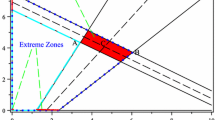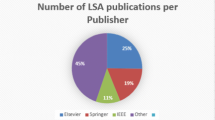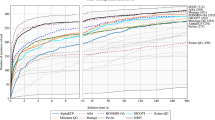Abstract
Being an extension of classical linear programming, disjunctive programming has the ability to express the problem constraints as combinations of linear equalities and inequalities linked with logic AND and OR operations. All the existing theories such as generalized disjunctive programming, optimization modulo theories, linear optimization over arithmetic constraint formula, and mixed logical linear programming pose one commonality of branching among different solving techniques. However, branching constructs a depth-first search which may traverse a whole bad subtree when the branching makes a mistake ordering a bad successor. In this paper, we propose the interleaved depth-first search with stochastic local optimal increasing (IDFS-SLOI) method for solving the linear optimization problem with disjunctive constraints. Our technique searches depth-first several subtrees in turn, accelerates the search by subtree splitting, and uses efficient backtracking and pruning among the subtrees. Additionally, the local optimal solution is improved iteratively by constructing and solving a stochastic linear programming problem. We evaluate our approach against existing counterparts on the rate-monotonic optimization problem (RM-OPT) and the linear optimization with fuzzy relation inequalities problem (LOFRI). Experimental results show that for the tested instances, the IDFS-SLOI method performs better from performance perspective, especially promising results have been obtained for the larger three groups where the execution time is reduced by 85.6 and 51.6% for RM-OPT and LOFRI, respectively.

Similar content being viewed by others
References
Dantzig, G.B.: Linear Programming and Extensions. Princeton University Press, Princeton (1998)
Lodi, A.: Mixed integer programming computation. In: Jnger, M., Liebling, TM., Naddef, D., Nemhauser, GL., Pulleyblank, WR., Reinelt, G., Rinaldi, G., Wolsey, LA. (eds.) 50 Years of Integer Programming 1958–2008, pp. 619–645. Springer (2010)
Boyd, S., Vandenberghe, L.: Convex Optimization. Cambridge University Press, Cambridge (2004)
Hooker, J.N., Osorio, M.A.: Mixed logical-linear programming. Discrete Appl. Math. 96, 395–442 (1999)
Chen, L., Lyu, Y., Wang, C., Wu, J., Zhang, C., Min-Allah, N., Alhiyafi, J., Wang, Y.: Solving linear optimization over arithmetic constraint formula. J. Glob. Optim. 69, 1–34 (2017)
Sebastiani, R., Tomasi, S.: Optimization modulo theories with linear rational costs. ACM Trans. Comput. Log. (TOCL) 16(2), 12 (2015)
Balas, E.: Disjunctive programming: properties of the convex hull of feasible points. MSRR No. 330 (1974)
Balas, E.: Disjunctive programming: properties of the convex hull of feasible points. Discrete Appl. Math. 89(1), 3–44 (1998)
Raman, R., Grossmann, I.E.: Modelling and computational techniques for logic based integer programming. Comput. Chem. Eng. 18(7), 563–578 (1994)
Vecchietti, A., Grossmann, I.: Computational experience with LogMIP solving linear and nonlinear disjunctive programming problems. In: Proceeding of FOCAPD, pp. 587–590. Citeseer (2004)
Sawaya, N., Grossmann, I.: A hierarchy of relaxations for linear generalized disjunctive programming. Eur. J. Oper. Res. 216(1), 70–82 (2012)
Trespalacios, F., Grossmann, I.E.: Algorithmic approach for improved mixed-integer reformulations of convex generalized disjunctive programs. INFORMS J. Comput. 27(1), 59–74 (2014)
Trespalacios, F., Grossmann, I.E.: Cutting plane algorithm for convex generalized disjunctive programs. INFORMS J. Comput. 28(2), 209–222 (2016)
Kirst, P., Rigterink, F., Stein, O.: Global optimization of disjunctive programs. J. Glob. Optim. 69, 1–25 (2017)
Ruiz, J.P., Grossmann, I.E.: Global optimization of non-convex generalized disjunctive programs: a review on reformulations and relaxation techniques. J. Glob. Optim. 67(1), 43–58 (2017)
Barrett, C., Tinelli, C.: Satisfiability modulo theories. In: Biere, A., Heule, M., van Maaren, H. (eds.) Handbook of Satisfiability, vol. 185, pp. 825–885. IOS Press (2009)
De Moura, L., Bjørner, N.: Satisfiability modulo theories: introduction and applications. Commun. ACM 54(9), 69–77 (2011)
Monniaux, D.: A survey of satisfiability modulo theory. In: International Workshop on Computer Algebra in Scientific Computing, pp. 401–425. Springer (2016)
Silva, J.P.M., and Sakallah, K.A.: GRASP: a new search algorithm for satisfiability. In: Proceedings of the 1996 IEEE/ACM International Conference on Computer-Aided Design, pp. 220–227. IEEE Computer Society (1997)
Moskewicz, M.W., Madigan, C.F., Zhao, Y., Zhang, L., Malik, S.: Chaff: engineering an efficient sat solver. In: Proceedings of the 38th Annual Design Automation Conference, pp. 530–535. ACM (2001)
Gomes, C.P., Selman, B., Kautz, H., et al.: Boosting combinatorial search through randomization. In: AAAI/IAAI, vol. 98, pp. 431–437 (1998)
Goldberg, E., Novikov, Y.: BerkMin: a fast and robust sat-solver. Discrete Appl. Math. 155(12), 1549–1561 (2007)
Hooker, J.N.: Logic, optimization, and constraint programming. INFORMS J. Comput. 14(4), 295–321 (2002)
Meseguer, P.: Interleaved depth-first search. In: IJCAI, vol. 97, pp. 1382–1387 (1997)
Plaisted, D.A., Greenbaum, S.: A structure-preserving clause form translation. J. Symb. Comput. 2(3), 293–304 (1986)
de la Tour, T.B.: An optimality result for clause form translation. J. Symb. Comput. 14(4), 283–301 (1992)
Li, Y., Albarghouthi, A., Kincaid, Z., Gurfinkel, A., Chechik, M.: Symbolic optimization with SMT solvers. In: ACM SIGPLAN Notices, vol. 49, pp. 607–618. ACM (2014)
Sebastiani, R., Tomasi, S.: Optimization in SMT with \({\cal{LA}}({\mathbb{Q}})\) cost functions. In: Gramlich, B., Miller, D., Sattler, U. (eds.) Automated Reasoning, pp. 484–498. Springer (2012)
Sawaya, N.W., Grossmann, I.E.: A cutting plane method for solving linear generalized disjunctive programming problems. Comput. Chem. Eng. 29(9), 1891–1913 (2005)
Trespalacios, F., Grossmann, I.E.: Improved Big-M reformulation for generalized disjunctive programs. Comput. Chem. Eng. 76, 98–103 (2015)
Vielma, J.P.: Mixed integer linear programming formulation techniques. SIAM Rev. 57(1), 3–57 (2015)
Liu, J., Wang, Y., Wang, Y., Xing, J., Zeng, H.: Real-time system design based on logic or constrained optimization. J. Softw. 17(7), 1641–1649 (2006)
Liu, C.L., Layland, J.W.: Scheduling algorithms for multiprogramming in a hard-real-time environment. J. ACM (JACM) 20(1), 46–61 (1973)
Min-Allah, N., Khan, S.U., Yongji, W.: Optimal task execution times for periodic tasks using nonlinear constrained optimization. J. Supercomput. 59(3), 1120–1138 (2012)
Bini, E., Buttazzo, G.C.: The space of rate monotonic schedulability. In: 23rd IEEE on Real-Time Systems Symposium, 2002. RTSS 2002, pp. 169–178. IEEE (2002)
Fang, S., Li, G.: Solving fuzzy relation equations with a linear objective function. Fuzzy Sets Syst. 103(1), 107–113 (1999)
Ghodousian, A., Khorram, E.: Fuzzy linear optimization in the presence of the fuzzy relation inequality constraints with max–min composition. Inf. Sci. 178(2), 501–519 (2008)
Su, C., Guo, F.: Solving interval-valued fuzzy relation equations with a linear objective function. In: International Conference on Fuzzy Systems and Knowledge Discovery, pp. 380–385 (2009)
Guo, F., Pang, L., Meng, D., Xia, Z.: An algorithm for solving optimization problems with fuzzy relational inequality constraints. Inf. Sci. 252, 20–31 (2013)
Miyagi, H., Kinjo, I., Fan, Y.: Qualified decision-making using the fuzzy relation inequalities. In: IEEE International Conference on Systems, Man, and Cybernetics, vol. 2, pp. 2014–2018 (1998)
Wang, H., Wang, C.H.: A fixed-charge model with fuzzy inequality constraints composed by max-product operator. Comput. Math. Appl. 36(7), 23–29 (1998)
Acknowledgements
This work is jointly supported by the CAS/SAFEA International Partnership Program for Creative Research Teams, and the Natural Science Foundation of China under Grants 61379048 and 61672508.
Author information
Authors and Affiliations
Corresponding author
Rights and permissions
About this article
Cite this article
Lyu, Y., Chen, L., Zhang, C. et al. An interleaved depth-first search method for the linear optimization problem with disjunctive constraints. J Glob Optim 70, 737–756 (2018). https://doi.org/10.1007/s10898-017-0602-1
Received:
Accepted:
Published:
Issue Date:
DOI: https://doi.org/10.1007/s10898-017-0602-1




